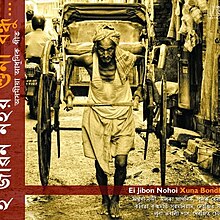Parvati Prasad Baruva (1904–1964) was a noted poet, lyricist, and dramatist: an icon of Assamese literature and the culture of Assam. Known for his simple and sensitive use of the Assamese language, he is popularly known as the Geetikavi; the lyrical poet of Assam. He was also one of the early pioneering filmmakers of Assamese cinema.
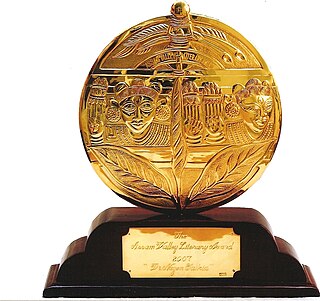
The Assam Valley Literary Award was conceived in the year 1990 by Williamson Magor Education Trust to honour creative writers who have enhanced Assamese literature.

Pratima Barua Pandey was an Indian folk singer from the royal family of Gauripur in Western Assam's Dhubri district. Barua Pandey, a national awardee, best known for her Goalpariya songs Hastir Kanya and Mur Mahut Bandhure, was the daughter of Prakritish Chandra Barua (Lalji) and niece of filmmaker Pramathesh Barua of Devdas fame.
Gunabhiram Barua (1837-1894) was a nineteenth century Indian intellectual from Assam who ushered in new ideas of social reform in the early years of colonial rule in Assam. He was deeply influenced by the progressive intellectual currents of the Bengal Renaissance. He was among the few Assamese publicists who had formally entered the Brahmo Samaj. All his life he propagated its liberal ideas through his writings.

The Eastern Fare Music Foundation is a music school, as well as a production and publishing house in Guwahati, Assam, India. The institute provides training for instrumental music in Western Classical music, Carnatic music and contemporary style. It was first founded in Bangalore in 2007. In 2016, the institute started its branches in Guwahati and Shillong. The branches in North East India provide classes in dance and Indian classical music.
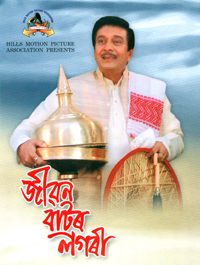
Jeevan Baator Logori is a 2009 Indian Assamese language drama film directed by Timothy Das Hanche under the banner Hills Motion Pictures Association of Diphu. The film is set in the rural and urban areas of Assam and shot at Cinemascope on the 35mm format.
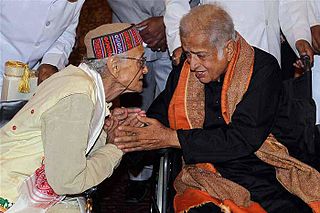
Mahim Bora was an Indian writer and educationist from Assam. He was elected as a president of the Assam Sahitya Sabha held in 1989 at Doomdooma. He was awarded most notably the Padma Shri in 2011, the Sahitya Akademi Award in 2001 and the Assam Valley Literary Award in 1998. Assam Sahitya Sabha conferred its highest honorary title Sahityacharyya on him in 2007.He also participated in the Quit India Movement of 1942 held in Kaliabor town in the Nagaon district of Assam.
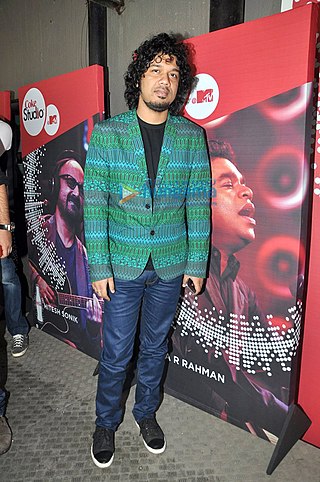
Angaraag Mahanta, known by his stagename Papon, is an Indian playback singer and composer from Assam. Papon has also sung in many languages apart from Assamese like Hindi, Bengali, Tamil and Marathi. He is the lead vocalist and founder of the folk-fusion band Papon and The East India Company. He is the son of the noted Assamese singer Khagen Mahanta and Archana Mahanta.
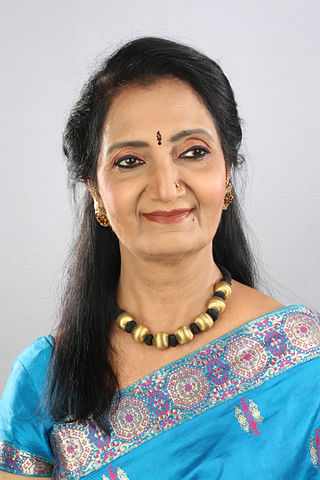
Beauty Sharma Barua is a singer from Assam, India. She is one of the best-known and most respected Assamese folk music, Indian classical music, ghazal and bhajan singers of Assam. More popularly known as The Melody Queen of Assam and Beauty Baideu, she has recorded over a thousand songs for All India Radio, Doordarshan, albums and others. She has sung songs in over six regional Indian languages, though primarily in Assamese and Hindi. Beauty Barua married renowned writer and lyricist Dwijendra Mohan Sharma (1948–2006), called the Man with Melody in His Pen by The Daily Telegraph, in 1976.

Jim Ankan Deka is an Indian musician, documentary film maker, photographer and director of Bangalore based organisation and music school Eastern Fare Music Foundation. He is the first person from Assam to open a music institute and a production house in Bangalore, India. He won multiple awards for his song Aawaz - speak up against sexual violence based on the 2012 Delhi gang rape incident.

Borolar Ghor is a 2012 bilingual Assamese-Bengali romantic comedy film starring Utpal Das and Debasmita Banerjee in the lead roles. The film was directed and produced by Mani C. Kappan under the banner of Okay Productions. This film was the remake of 1993 superhit Malayalam film Meleparambil Aanveedu, which was also produced by Kappan under the same production house. Noted Assamese filmmaker Manju Borah acted as an advisor in the film.

Ekhon Nedekha Nodir Xhipare is a 2012 Assamese language socio-political thriller film, with some dialogue in Hindi, starring Sanjay Suri and Bidita Bag in the lead roles. It was directed by Bidyut Kotoky and produced by National Film Development Corporation of India. The film was simultaneously made in Hindi as As the river flows.
Dipali Barthakur was an Indian singer from Assam. Her songs were sung mainly in the Assamese language. She received the fourth-highest civilian award of India, the Padma Shri, in the year 1998.

Chandra Kumar Agarwala was a writer, poet, journalist from Assam. He is a pioneer of the Jonaki Era, the age of romanticism of Assamese literature. Agarwala was titled as Pratimar Khonikor in Assamese literature. Agarwala was the first editor and financer of the Jonaki magazine and a founder member of Asamiya Bhasa Unnati Sadhini Sabha, a literary organization of Assam with his intimate friends Lakshminath Bezbarua and Hemchandra Goswami. Agarwala, along with his friend Lakshminath and Hemchandra, are known as "Trimurti of Assamese literature" for their remarkable contribution to the very beginning of modern Assamese literature. Chandra Kumar Agarwala was the brother of writer and poet Ananda Chandra Agarwala and uncle of Jyoti Prasad Agarwala, a noted poet, playwright, composer, lyricist, writer and first Assamese Filmmaker.
Ananda Chandra Barua (1907–1983) was a writer, poet, playwright, translator, journalist and actor from Assam. He is popularly known as Bokulbonor Kobi in Assamese literacy society. He was honoured with, most notably the Padma Shri title and Sahitya Akademi award.
Anuradha is an Assamese language drama film directed by Rakesh Sharma and starring Meghranjani and Diganta Hazarika in the lead roles. The film was produced by Luit Kumar Barman under the banner of M L Entertainment and Cine Dream Unlimited, and released on 27 March 2015.

Queen Hazarika is an Indian playback singer and actress from Assam. She has sung for Assamese films like Hiya Diya NiyaGaram Botaah, Mon, Suren Suror Putek and Sneh Bandhan. She is the recipient of Rotary Young Achiever Award in 2013. In the same year she was nominated for Prag Cine Awards in the Best Female Playback category.
Nayak is a 2001 Indian Assamese romantic drama movie directed by Munin Barua and produced under the banner of Pooja Motion Pictures. Music was composed by Zubeen Garg. The film was released on 30 November 2001.
